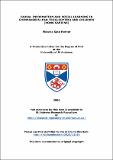Causal information and social learning in chimpanzees (Pan troglodytes) and children (Homo sapiens)
Abstract
Many of the tool-using activities of both chimpanzees and children involve a complex mixture of interconnected causal relationships between a tool and a reward, and much of this tool-use is thought to be acquired, at least in part, by social learning. However, despite the considerable research effort focused on both causal understanding and social learning, few studies have directly addressed the potential interaction between these areas. It seems likely that the way in which an individual learns to use a tool through observation will be significantly influenced by its understanding of the causal relationships that it observes. This thesis presents a series of nine experiments with 3- to 7-year-old chimpanzees and 3- 6-year-old children, designed to investigate whether causal information is involved in determining which social learning strategy they employ. The first set of experiments demonstrated that chimpanzees could be influence to switch between imitation and emulation to solve the same task, by altering the availability of causal information. When causal information was available, by presenting a tool-use task in a transparent condition, chimpanzees were found to reproduce only the results of a model's behaviour, consistent with emulation. However, when the availability of causal information was restricted, by presenting the same task in an opaque condition, the chimpanzees included a greater proportion of the model's behaviour, consistent with imitation. The second set of experiments revealed that chimpanzees could learn specific causal information by observation, such as the significance of tool-reward contact. However, they may be overwhelmed by observing multiple causal relationships, or those involving unobservable causal principles, such as gravity or force. The common view that the widespread evidence for emulation in chimpanzee social learning studies indicates a deficit of imitative capacity may therefore be misleading. The results of this thesis suggest more generally that when causal information is available, chimpanzees tend to use emulation. They are also able to imitate, but do so mainly in situations where emulation is not possible. Thus, the availability of causal information plays an important role in chimpanzee social learning, by determining which learning strategy is employed, and ultimately the degree of behavioural fidelity that is achieved, hi contrast, the studies with children revealed that they imitate the actions that they observe without appearing to consider the causal efficiency of their behaviour. This may be due to a greater focus on the actions of a demonstrator rather than the results or goals of their behaviour, and a greater tendency to interpret those actions as intentional.
Type
Thesis, PhD Doctor of Philosophy
Collections
Items in the St Andrews Research Repository are protected by copyright, with all rights reserved, unless otherwise indicated.

